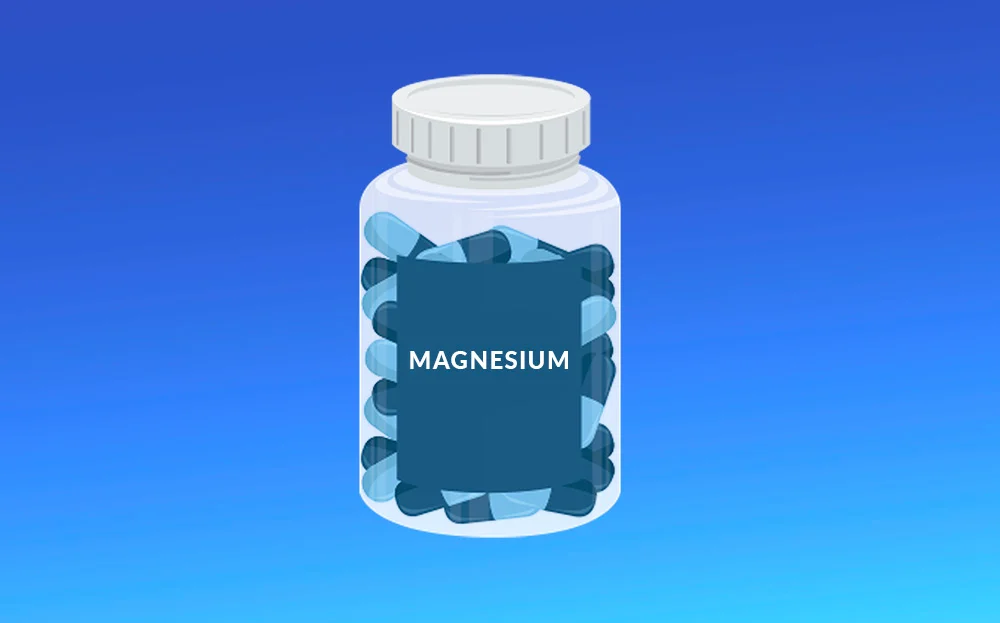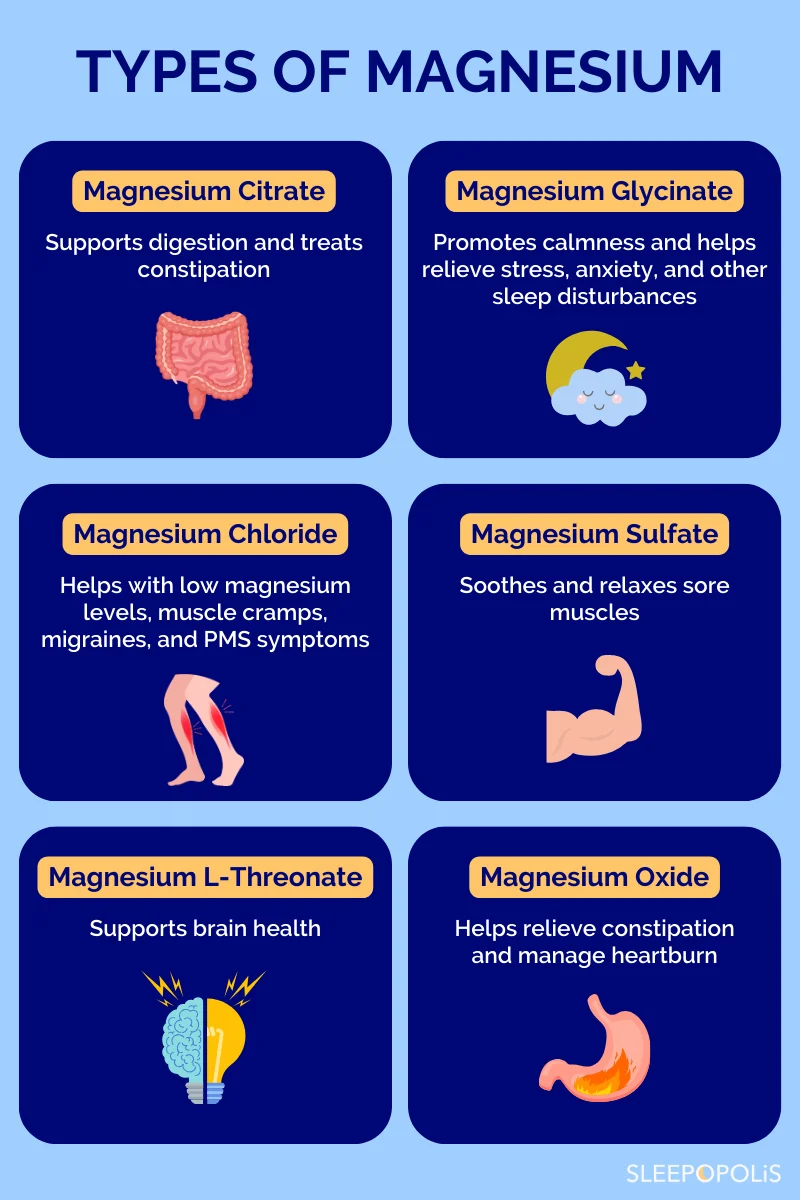
The importance and functions of magnesium in your body and the best food sources are well documented. However, that doesn’t mean it’s easy to sift through the many types of magnesium that you find in the supplement aisle or understand their best uses. We’re breaking this down to make choosing a magnesium supplement easier, including a types of magnesium chart to compare options.
Note: The content on Sleepopolis is meant to be informative in nature, but it shouldn’t be taken as medical advice, and it shouldn’t take the place of medical advice and supervision from a trained professional. If you feel you may be suffering from any sleep disorder or medical condition, please see your healthcare provider immediately. Additionally, restrictions and regulations on supplements may vary by location. If you ever have any questions or concerns about a product you’re using, contact your doctor.
Key Takeaways
- Magnesium is a mineral with many responsibilities in your everyday health and wellness.
- Many people find that a magnesium supplement helps meet their needs or supports a health goal, like more relaxed muscles, a calmer mind, or more regular trips to the bathroom.
- Some of the most common types of magnesium include magnesium oxide, magnesium citrate, magnesium glycinate, and magnesium chloride, though there are several others.
- The best type of magnesium supplement for you depends on factors like your health goals, age, sex, values as a consumer, and what your healthcare provider recommends; however, the best type of magnesium for sleep is likely magnesium glycinate, though individual responses vary.
What is Magnesium?
Magnesium is a mineral found abundantly in your body. It’s involved in over 300 enzymatic processes that are critical for everyday health. For example, magnesium supports blood sugar and blood pressure regulation, healthy nerve and muscle function, protein synthesis, and maintaining a normal heart rate. (1) Low magnesium levels may be associated with poor blood sugar regulation, headaches, and problems with heart or bone health. (2)
It’s important to incorporate magnesium-rich foods in your diet to replenish your daily needs. Some examples include nuts and seeds such as almonds, pumpkin seeds, and sunflower seeds, legumes like black beans and chickpeas, whole grains such as brown rice and quinoa, and some types of fatty fish like salmon and mackerel. (3)
If you don’t eat many food sources of magnesium, you might consider a magnesium supplement to help meet your daily needs. This is a good question to ask your healthcare provider, pharmacist, or registered dietitian, who can examine your diet pattern and recommend a test to check your blood levels. (4)
How Can Magnesium Improve Sleep?
More people are seeking natural sleep aids to help improve their rest, and magnesium is an increasingly popular choice. As a natural relaxant, magnesium helps to calm the body and mind, making it easier to unwind and fall asleep.
Additionally, magnesium plays a role in regulating your body’s production of melatonin, a hormone that controls sleep-wake cycles. (5) Melatonin levels rise at night to signal to your body that it’s time for bed and decrease in the morning to prime you for waking up. By enhancing melatonin levels, magnesium can help to synchronize your body’s internal clock and improve overall sleep quality. (5)
Furthermore, research suggests that magnesium deficiency may be linked to sleep disorders such as insomnia and restless leg syndrome. (6)(7) Ensuring adequate magnesium intake through diet and/or supplementation may be beneficial for those struggling with sleep issues, leading to more restful nights. Of course, different types of magnesium are known to have different benefits — read on to find out which might be best for you.
Magnesium Citrate
The combination of magnesium with citric acid creates a highly absorbable compound: magnesium citrate. This type of magnesium is one of the best options to increase magnesium levels in your body, following magnesium chloride. (8) This form is often used to relieve constipation, as it draws water into your intestines. (9)
Additionally, magnesium citrate helps support bone health by promoting calcium absorption into bone tissue. (10)
However, magnesium citrate may trigger side effects in some people, such as diarrhea, abdominal discomfort, and nausea. The risk is higher when taken in large doses, but taking this supplement with food can help decrease your overall risk of side effects. (2)
Magnesium Oxide
One of the primary uses of magnesium oxide is to relieve constipation because it’s not well-absorbed and promotes motility on its way through the body. It may also help manage heartburn by neutralizing stomach acid. (11)(12)
However, magnesium oxide is not as easily absorbed as other forms, which can promote potential side effects such as diarrhea, abdominal discomfort, and bloating, particularly in high doses. Take it with food for a lower risk of side effects. (2)(13)
Magnesium Glycinate
In this form, magnesium is bound to the amino acid glycine to boost absorption and bioavailability. Due to its superior absorption rate compared to other forms of magnesium, magnesium glycinate is frequently used as part of a multifaceted approach for correcting magnesium deficiency. (14)
Bioavailability
Bioavailability refers to the extent to which a substance — in this case, a magnesium supplement — becomes accessible to your system. Magnesium glycinate has a high bioavailability which means that it is easier for the body to absorb and utilize than other forms.
Magnesium glycinate is also known for having calming properties, making it a popular choice for stress, anxiety, or sleep disturbances — it helps relax muscles and the nervous system, promoting calmness. Its calming effect stems from a few factors: magnesium glycinate’s high bioavailability and the relaxing properties of glycine itself. (15) Additionally, there’s some evidence that this form may also support headache management. (16)
Side effects associated with magnesium glycinate are rare and generally mild but may include gastrointestinal discomfort or diarrhea, particularly in excessive amounts. Taking it with food can help reduce some unwanted digestive side effects, as is the case with most types of magnesium. (2)
Magnesium Sulfate
Magnesium sulfate may be used orally for constipation, but it will be sold specifically as an oral supplement. The form of this type of magnesium that you may be more familiar with is Epsom salt, which is made of magnesium, sulfur, and oxygen. Many enjoy its therapeutic properties when using it in the bathtub to relax and soothe sore muscles. When dissolved in water, this form is absorbed directly through the skin. (17)
Speaking of taking magnesium orally — though many of us love a good bath soak, it’s important to note that Epsom salts are intended only for external bathing use and should never be taken orally. Ingesting them can be incredibly dangerous due to the high concentration of magnesium and how quickly it can raise blood levels of magnesium in the body. (18) (19) (20) The TDLR: If you’re looking to ingest magnesium, stick to a third-party-certified supplement or the magnesium-rich foods we discussed earlier.
Magnesium L-Threonate
In this form, magnesium is paired with L-threonate, a compound derived from vitamin C. This form is designed to boost magnesium absorption in your brain. (21)
Magnesium L-threonate may have benefits for brain health, including memory and learning. Additionally, magnesium L-threonate may be protective in a way that helps lower the risk of age-related cognitive decline. (22)
While magnesium L-threonate is generally well-tolerated, some people may experience mild digestive discomfort or diarrhea, particularly when first starting. Avoid taking it on an empty stomach to minimize your risk of digestive effects. (2)
Magnesium Chloride
This combination of magnesium and chlorine ions is well-absorbed and therefore multipurpose. It’s often used to address magnesium deficiency. It may also help alleviate muscle cramps, migraines, anxiety, and premenstrual symptoms. (2) (23)
Magnesium chloride is often used in the form of oil or sprays for better skin absorption. This allows magnesium to enter your bloodstream directly through your skin, and it may be a better option for people who have digestive sensitivities to supplementation. (24)
Still, as with other magnesium supplements, excessive use may lead to digestive symptoms like diarrhea. (2)

Other Forms of Magnesium
While some of the most common forms of supplemental magnesium are discussed above, those aren’t the only ones. You may come across others, such as magnesium malate, magnesium taurate, magnesium orotate, and magnesium lactate.
They may be recommended by your healthcare provider in certain instances, such as to correct a magnesium deficiency in someone who doesn’t tolerate another form or to help alleviate muscle-related symptoms or stress. Overall, human research on these less common forms of magnesium is currently limited. (25)
How to Choose the Right Magnesium for You
The supplement world can be daunting given how many options we have, and magnesium is no exception. If you’re in need of a magnesium supplement, you’re probably wondering what the most important factors are when choosing the best one for you. Here are some things to consider:
- Purpose: Different forms of magnesium may be more effective for different purposes. For instance, more absorbable forms may be preferred for correcting a magnesium deficiency quickly.
- Dosage: Unless prescribed otherwise by your provider, there’s no purpose for taking a magnesium supplement that exceeds the recommended dietary allowance (RDA). (26)
- Form: Consider whether an oral magnesium powder, tablet, liquid, or gummy makes the most sense for you — or perhaps Epsom salt added to your bath aligns best with your needs.
- Third-Party Certification: Whenever possible, choose a supplement that bears a third-party certification seal. Examples include NSF International, Consumer Lab, and USP. This indicates the product has been independently verified for purity, quality, and safety.
Magnesium Dosage
Typical magnesium supplement dosages vary depending on factors such as age, sex, health status, and individual needs, as well as the form and purpose of magnesium. For most healthy adults, the RDA for magnesium is around 310-420 mg per day, although this increases to around 310-360 mg per day during pregnancy and lactation. (2)
When it comes to supplementation, dosages commonly range from 100 to 400 milligrams per day, taken orally, according to options widely available online. Some healthcare providers may prescribe various dosages for specific health concerns, like treating muscle cramps, deficiencies, or migraines.
Magnesium supplements may be taken as a single dose or divided into multiple doses throughout the day to optimize absorption and minimize gastrointestinal side effects. Be sure to speak with your provider before adding a magnesium supplement to ensure that it’s safe and appropriate for you to do so.
FAQs
Which type of magnesium is best for sleep?
The best type of magnesium for sleep can vary by person. Magnesium glycinate is often used due to its high bioavailability and calming properties. It helps relax the body and mind, making it easier for some people to fall asleep and stay asleep throughout the night. Additionally, magnesium glycinate may also help to alleviate symptoms of anxiety and stress, further supporting restful sleep. (14)
Does magnesium help you sleep?
While results can vary, magnesium can help improve sleep quality by promoting relaxation and reducing stress and anxiety. Magnesium plays a crucial role in managing brain chemicals involved in the sleep-wake cycle, such as melatonin. (5) Plus, magnesium deficiency may be linked to sleep disturbances, so some people may find that supplements help. (6)
What is the best time to take magnesium for sleep?
The best time to take magnesium for sleep is typically in the evening, around 1-2 hours before bedtime. This timing allows magnesium to take effect as you prepare for sleep, promoting relaxation and helping to ease into a restful state.
The Last Word From Sleepopolis
Getting enough magnesium is essential for your health, so it’s important to make sure you have a steady supply. While you can get magnesium from foods like leafy greens, fatty fish, nuts, and seeds, some people find it helpful to add a supplemental form. Fortunately, there are plenty of options, whether you need one to alleviate constipation, relax your muscles, or improve your restfulness.
Overall, most magnesium supplements are fairly low risk for serious side effects when used as directed and when they don’t exceed the RDA. Take magnesium supplements with food to lower the likelihood of having digestive side effects.
If your main concern is improving sleep, magnesium glycinate appears to be among the best options. If you have questions about whether you should add a magnesium supplement and the best option, be sure to talk to your healthcare provider or registered dietitian.
Sources
- Schwalfenberg GK, Genuis SJ. The Importance of Magnesium in Clinical Healthcare. Scientifica (Cairo). 2017;2017:4179326. doi:10.1155/2017/4179326
- Magnesium Fact Sheet for Health Professionals. Office of Dietary Supplements. Updated 2 June 2022. Available from: https://ods.od.nih.gov/factsheets/Magnesium-HealthProfessional/
- Fiorentini D, Cappadone C, Farruggia G, Prata C. Magnesium: Biochemistry, Nutrition, Detection, and Social Impact of Diseases Linked to Its Deficiency. Nutrients. 2021;13(4):1136. Published 2021 Mar 30. doi:10.3390/nu13041136
- Magnesium Blood Test. Medline Plus. Updated 25 Oct 2023. Available from: https://medlineplus.gov/lab-tests/magnesium-blood-test/
- Cao Y, Zhen S, Taylor AW, Appleton S, Atlantis E, Shi Z. Magnesium Intake and Sleep Disorder Symptoms: Findings from the Jiangsu Nutrition Study of Chinese Adults at Five-Year Follow-Up. Nutrients. 2018;10(10):1354. Published 2018 Sep 21. doi:10.3390/nu10101354
- Arab A, Rafie N, Amani R, Shirani F. The Role of Magnesium in Sleep Health: a Systematic Review of Available Literature. Biol Trace Elem Res. 2023;201(1):121-128. doi:10.1007/s12011-022-03162-1
- Mansur A, Castillo PR, Rocha Cabrero F, et al. Restless Legs Syndrome. [Updated 2023 Feb 27]. In: StatPearls [Internet]. Treasure Island (FL): StatPearls Publishing; 2024 Jan-. Available from: https://www.ncbi.nlm.nih.gov/books/NBK430878/
- Schwalfenberg GK, Genuis SJ. The Importance of Magnesium in Clinical Healthcare. Scientifica (Cairo). 2017;2017:4179326. doi:10.1155/2017/4179326
- Werner T, Kolisek M, Vormann J, et al. Assessment of bioavailability of Mg from Mg citrate and Mg oxide by measuring urinary excretion in Mg-saturated subjects. Magnes Res. 2019;32(3):63-71. doi:10.1684/mrh.2019.0457
- Rondanelli M, Faliva MA, Tartara A, et al. An update on magnesium and bone health. Biometals. 2021;34(4):715-736. doi:10.1007/s10534-021-00305-0
- Chang L, Chey WD, Imdad A, et al. American Gastroenterological Association-American College of Gastroenterology Clinical Practice Guideline: Pharmacological Management of Chronic Idiopathic Constipation. Gastroenterology. 2023;164(7):1086-1106. doi:10.1053/j.gastro.2023.03.214
- Mori H, Tack J, Suzuki H. Magnesium Oxide in Constipation. Nutrients. 2021;13(2):421. Published 2021 Jan 28. doi:10.3390/nu13020421
- Schuchardt JP, Hahn A. Intestinal Absorption and Factors Influencing Bioavailability of Magnesium-An Update. Curr Nutr Food Sci. 2017;13(4):260-278. doi:10.2174/1573401313666170427162740
- Ates M, Kizildag S, Yuksel O, et al. Dose-Dependent Absorption Profile of Different Magnesium Compounds. Biol Trace Elem Res. 2019;192(2):244-251. doi:10.1007/s12011-019-01663-0
- Salceda R. Glycine neurotransmission: Its role in development. Front Neurosci. 2022;16:947563. Published 2022 Sep 16. doi:10.3389/fnins.2022.947563
- Yablon LA, Mauskop A. Magnesium in headache. In: Vink R, Nechifor M, editors. Magnesium in the Central Nervous System [Internet]. Adelaide (AU): University of Adelaide Press; 2011. Available from: https://www.ncbi.nlm.nih.gov/books/NBK507271/
- Chakraborty A. Bathing Practices in Dermatology: Uses and Implications for Patient Management. Indian Dermatol Online J. 2023;14(5):686-691. Published 2023 Aug 10. doi:10.4103/idoj.idoj_40_23
- Hicks MA, Tyagi A. Magnesium Sulfate. [Updated 2023 May 1]. In: StatPearls [Internet]. Treasure Island (FL): StatPearls Publishing; 2024 Jan-. Available from: https://www.ncbi.nlm.nih.gov/books/NBK554553/
- Walker P, Parnell S, Dillon RC. Epsom Salt Ingestion Leading to Severe Hypermagnesemia Necessitating Dialysis. J Emerg Med. 2020;58(5):767-770. doi:10.1016/j.jemermed.2020.04.023
- Shoaib Khan M, Zahid S, Ishaq M. Fatal Hypermagnesemia: an acute ingestion of Epsom Salt in a patient with normal renal function. Caspian J Intern Med. 2018;9(4):413-415. doi:10.22088/cjim.9.4.413
- Shen Y, Dai L, Tian H, et al. Treatment Of Magnesium-L-Threonate Elevates The Magnesium Level In The Cerebrospinal Fluid And Attenuates Motor Deficits And Dopamine Neuron Loss In A Mouse Model Of Parkinson’s disease. Neuropsychiatr Dis Treat. 2019;15:3143-3153. Published 2019 Nov 11. doi:10.2147/NDT.S230688
- Zhang C, Hu Q, Li S, et al. A Magtein®, Magnesium L-Threonate, -Based Formula Improves Brain Cognitive Functions in Healthy Chinese Adults. Nutrients. 2022;14(24):5235. Published 2022 Dec 8. doi:10.3390/nu14245235
- Parazzini F, Di Martino M, Pellegrino P. Magnesium in the gynecological practice: a literature review. Magnesium in the gynecological practice: a literature review. Magnes Res. 2017;30(1):1-7. doi:10.1684/mrh.2017.0419
- Gröber U, Werner T, Vormann J, Kisters K. Myth or Reality-Transdermal Magnesium?. Nutrients. 2017;9(8):813. Published 2017 Jul 28. doi:10.3390/nu9080813
- Noah L, Dye L, Bois De Fer B, Mazur A, Pickering G, Pouteau E. Effect of magnesium and vitamin B6 supplementation on mental health and quality of life in stressed healthy adults: Post-hoc analysis of a randomised controlled trial. Stress Health. 2021;37(5):1000-1009. doi:10.1002/smi.3051
- Souza ACR, Vasconcelos AR, Dias DD, Komoni G, Name JJ. The Integral Role of Magnesium in Muscle Integrity and Aging: A Comprehensive Review. Nutrients. 2023;15(24):5127. Published 2023 Dec 16. doi:10.3390/nu15245127


























